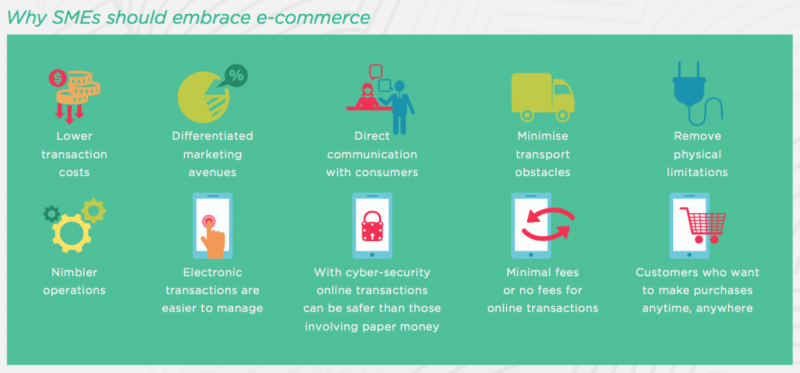E-commerce in SME development
With their limited resources, SMEs face numerous challenges in e-commerce adoption. If successfully implemented, however, e-commerce can ensure that SMEs not only survive but are able to outperform the market.
According to Euromonitor, online space in the US grew by 14 per cent in 2014, while in China it grew by 35 per cent. Companies, irrespective of their sizes, must now be prepared to handle digitally-empowered consumers who want to shop and pay online at a mouse-click. E-commerce is high on the agenda for large corporations, but what about SMEs?

Difficult but necessary
For SMEs, internal barriers to e-commerce adoption include organisational, financial and technical factors while external barriers include social, political and regulatory factors.
‘When you go digital, you are investing for the future. It is not ROIs for tomorrow,’
SMEs typically have a small number of stakeholders; a closed ecosystem of staff and suppliers; a simple structure and value chain; and limited resources. Where e-commerce is concerned, SMEs often have little experience and, compared to large businesses, they have fewer options to implement e-commerce on a large scale.
Not surprisingly, e-commerce is a daunting proposition for many SMEs and it is not just because of the potentially large upfront costs. There are simply too many unfamiliar aspects ranging from data security to order tracking and accounting, and SMEs might even need the services of a call-centre. Besides teaming up with the right technology partner, an SME also needs to work with a logistics company to ensure smooth fulfilment of online orders—this is especially important since, in an e-commerce model, the logistics company often provides the only in-person encounter between the customer and the SME.
Once an SME has introduced e-commerce, the facility cannot be allowed to languish. Resources must be channelled to promoting it via search engine optimisation and various digital marketing initiatives. In many ways, introducing e-commerce into a business is akin to starting a whole new business, and many SMEs simply do not have the wherewithal to pull it off.
There is also the challenge of adapting to change. While this is not unique to SMEs, mind-set transformation remains a big hurdle. Internally, SMEs must overcome resistance from those who insist that the traditional way of doing business works best.’When you go digital, you are investing for the future. It is not ROIs for tomorrow,’ said Jagjit Kaur, Head, Digital Innovation & Transactional Banking (Wholesale Banking), Hong Leong Islamic Bank Berhad, Malaysia
Click to start
What will SMEs decide to do? Perhaps with more success stories, SMEs will adopt e-commerce in greater numbers. Where mind-sets are concerned, younger-generation SME owners are better able to grasp the importance of e-commerce and are more open to embracing new technologies. Many observers believe that SMEs will have little choice but to implement e-commerce solutions just to survive, let alone thrive.

___________________
This report is based on a panel discussion at the 11th WIEF in Kuala Lumpur, Malaysia in 2015.
Photo Credit:
Heidi Sandstrom.





